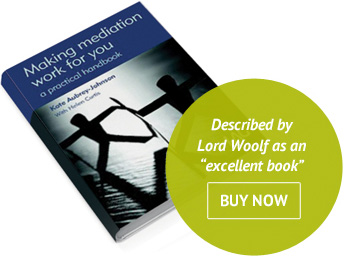BLOG
Liz Davies welcomes Andrew Arden QC’s conversion to mediation for housing cases
August 11, 2013
In the latest issue of the Journal of Housing Law ([2013] JHL Issue 4), Andrew Arden QC, the Journal’s Editor and well-known “godfather of housing law” (Chambers and Partners), tells us how his views on mediation have developed. In 2005 he was “a fairly cautious convert”, concerned that mediation might not be appropriate for housing cases, given the inequality between the parties, the specialist law involved, and that housing cases usually require “the breadth of thinking that lawyers are trained (and the courts equipped) to bring to a case”.
He’s now been won over to the benefits of mediation, having been “repeatedly struck by just how apt it is for housing” and how little it is used. As a humble housing lawyer working away at the coal-face first dug out by Arden, I agree with him. I’m repeatedly struck by how litigation is not always the best way of resolving disputes between landlords and tenants.
There can be no doubt that when a pure point of housing law is at issue, such as whether an agreement to occupy is a tenancy or a licence, or whether a local housing authority has made an error of law in its decision-making, only a Judge can decide the issue, and the Judge needs assistance from specialist advocates. There can also be no doubt that sometimes parties are so intransigent that only a firm and final decision from a Judge can resolve the issue.
However, often participants aren’t always looking for the definitive answers that a Judge gives. Landlords want rent to be paid on time; tenants want to live peaceably; leaseholders and freeholders don’t want to be in dispute with each other. Allegations of anti-social behaviour might need everyone to sit round a table and consider solutions other than eviction.
Even in homelessness appeals, which involve only pure points of law, litigation doesn’t necessarily provide a solution. I’ve lost count of the number of times I’ve told a client that the Judge won’t order the local authority to give you a house, no matter how sorry the Judge might feel for you. For homelessness applicants, that’s the real issue: will I get housed or help to find a house? They are not interested in fascinating points of law. If they win, they’re devastated to find that usually means simply that the local housing authority has to reconsider its decision.
Arden makes the point that specialist, skilled mediation can draw landlords away from excessive reliance on their powers. He adds that mediators can also “draw the tenant (and perhaps even the homeless person or applicant for an allocation) away from an unqualifiedly subjective approach to his own perceived needs”. I’m not sure that it’s possible to achieve the latter. Tenants usually want to keep their homes (or be rehoused into a better home) and nobody needing a home gives up that aim. But mediation can make it clear to a tenant (or homeless person) the huge pressure that there is on social housing, the limited resources available and therefore that his or her aims must be realistic. Those issues are often the background to litigation, but are rarely centre-stage.
Mediation contains more options than litigation. Litigation is all or nothing: a tenant is evicted or not; the local housing authority got the law wrong or not. Mediation is ideal for housing cases because it offers far more options: moving a tenant, considering priority on the allocation scheme, helping with finding alternative accommodation, perhaps offering rent-free accommodation in lieu of compensation or a longer tenancy than the private landlord would normally offer. The great thing about mediation is that no options are off limits.
Arden is right to be concerned about inequality of arms. Institutional landlords will always be able to afford lawyers; as legal aid cuts bite, fewer and fewer tenants are represented. But that inequality of arms is even more devastating in a court-room than it is in mediation, precisely because housing law is such a complex area. Better for everyone to be focusing on practical outcomes than debating the finer points of statutory and contractual construction in order to ascertain what type of tenancy the litigant has. A debate that will normally exclude most litigants in person and take place solely between the landlord’s lawyer and the Judge in court can achieve a sustainable resolution with less stress via mediation.

